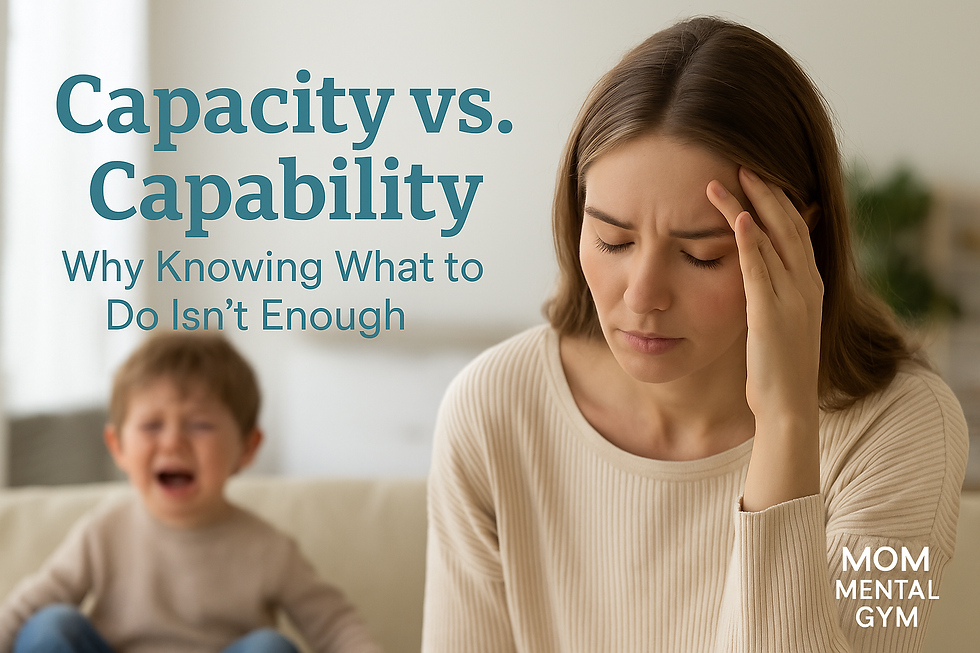Capacity vs. Capability: Why Knowing What to Do Isn’t Enough
- Sep 10, 2025
- 3 min read
What Scripture and Science Say About Why You Still Feel Stuck
By Francini Estes | Mom Mental Gym
“I know what to do… but I still can’t seem to do it.”
You’ve read the parenting books.
You’ve listened to the podcasts.
You’ve downloaded all the right tools.
But when the pressure builds…
You snap. When the chaos hits…
You shut down. When your child melts down… so do you.
And the guilt rolls in.
Maybe you’re thinking: "If I know what to do, why can't I actually do it?"

Capability vs. Capacity
Let’s break it down:
Capability = the skills, knowledge, and strategies you’ve learned.
Capacity = your ability to access and use those tools under stress.
“The spirit indeed is willing, but the flesh is weak.” —Matthew 26:41
This verse beautifully illustrates the point: you can want to do the right thing, know the right thing… and still fall short because your capacity is drained.
You’re not broken. You’re just running on empty.
What the Research Says
Here’s what science tells us:
According to Polyvagal Theory (Porges, 2011), a dysregulated nervous system shuts down your logic, reasoning, and relational capacity—and instead prioritizes fight, flight, or freeze.
A 2021 study in the Journal of Child and Family Studies found that a mother’s emotional regulation capacity was a stronger predictor of parenting success than education level or parenting knowledge.
📌 Translation:It’s not just about what you know—it’s about your inner fuel.
Scripture: Strengthened in the Inner Man
Paul’s prayer in Ephesians 3:16 becomes a lifeline for moms:
“That he would grant you… to be strengthened with might by his Spirit in the inner man.”
Christ doesn’t expect us to mother out of sheer willpower.He invites us to build strength from the inside out.
“Come unto me… and I will give you rest… For my yoke is easy, and my burden is light.” —Matthew 11:28–30
Why Tools Alone Don’t Work
When you’re mentally tired, emotionally raw, spiritually disconnected, or physically depleted, your access to logic and patience shuts down.
That’s not a failure—it’s a capacity issue.
🏋️♀️ What You Really Need: A Capacity Gym for Moms
Inside Mom Mental Gym, we rebuild capacity across four key domains:
Mental – Reset thought patterns and manage stress
Emotional – Process pain, avoid reactivity, and build regulation
Spiritual – Reconnect with divine truth and Christ-centered identity
Physical – Create habits of rest, nutrition, and movement
Because capability without capacity = burnout. And capacity fuels capability.
Ready to Refill?
Right now, you can start in two ways:
1:1 Coaching Consult (HALF OFF for a limited time!)
Work directly with me to identify your depleted zones and create a customized path back to peace.
💧 Signature Course: From Pitcher to Well
A self-paced journey designed to rebuild your capacity from the inside out—one drop at a time.
Final Thought
“Let us not be weary in well doing: for in due season we shall reap, if we faint not.” —Galatians 6:9
You don’t need to try harder.
You need to be refilled.
Come to the Gym.
Refill. Rebuild. Rise.
Let's do this together.
We have a place for you.
Sources:
Polyvagal Theory:
Porges, S. W. (2011). The polyvagal theory: Neurophysiological foundations of emotions, attachment, communication, self-regulation. W. W. Norton & Company
Maternal Emotional Regulation Study:
Rothenberg, W. A., Lansford, J. E., Bornstein, M. H., Deater-Deckard, K., Di Giunta, L., Dodge, K. A., ... & Al-Hassan, S. M. (2021). Emotional self-regulation in mothers: Links to parenting and child adjustment in diverse cultural contexts. Journal of Child and Family Studies, 30(4), 946–961. https://doi.org/10.1007/s10826-021-01919-w


Comments